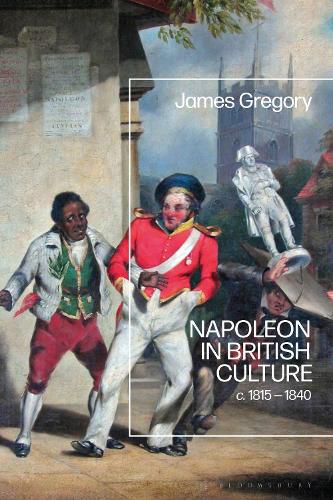Readings Newsletter
Become a Readings Member to make your shopping experience even easier.
Sign in or sign up for free!
You’re not far away from qualifying for FREE standard shipping within Australia
You’ve qualified for FREE standard shipping within Australia
The cart is loading…






This book studies British cultural engagement with Napoleon Bonaparte from his 1815 surrender and time in British custody, until the return of his remains to France in 1840.
Adopting a chronological approach, James Gregory studies the British use of Bonaparte in various spheres - covering political, dramatic, literary, and visual culture, and popular entertainment over a 25-year period. Gregory acknowledges not only canonical literary treatments, but also appearances of the figure in novels, anecdotes, travelling shows, and private collections - in order to analyse contemporary fascination with Napoleon.
Centring on key themes such as responses to Napoleon's presence on British territory, and later reactions to his death, Gregory also takes into account the influence of factors such as geography and gender, in order to craft a comprehensive picture of cultural engagement with Napoleon in the period 1815-40. Covering factors including the role of commemoration, the impact of Peterloo and Queen Caroline's death, and the rise of Romanticism, this book demonstrates how truly pervasive the myth of Napoleon became in 19th-century Britain.
$9.00 standard shipping within Australia
FREE standard shipping within Australia for orders over $100.00
Express & International shipping calculated at checkout
Stock availability can be subject to change without notice. We recommend calling the shop or contacting our online team to check availability of low stock items. Please see our Shopping Online page for more details.
This book studies British cultural engagement with Napoleon Bonaparte from his 1815 surrender and time in British custody, until the return of his remains to France in 1840.
Adopting a chronological approach, James Gregory studies the British use of Bonaparte in various spheres - covering political, dramatic, literary, and visual culture, and popular entertainment over a 25-year period. Gregory acknowledges not only canonical literary treatments, but also appearances of the figure in novels, anecdotes, travelling shows, and private collections - in order to analyse contemporary fascination with Napoleon.
Centring on key themes such as responses to Napoleon's presence on British territory, and later reactions to his death, Gregory also takes into account the influence of factors such as geography and gender, in order to craft a comprehensive picture of cultural engagement with Napoleon in the period 1815-40. Covering factors including the role of commemoration, the impact of Peterloo and Queen Caroline's death, and the rise of Romanticism, this book demonstrates how truly pervasive the myth of Napoleon became in 19th-century Britain.